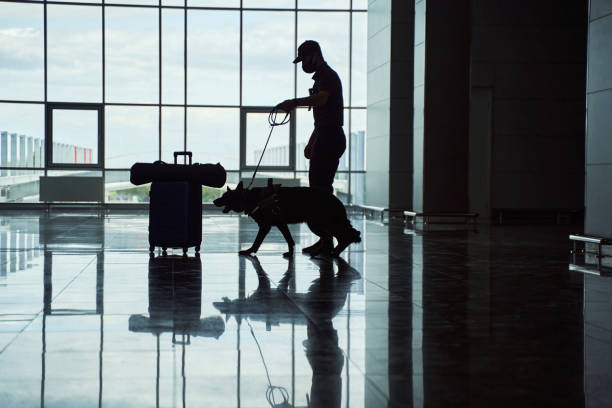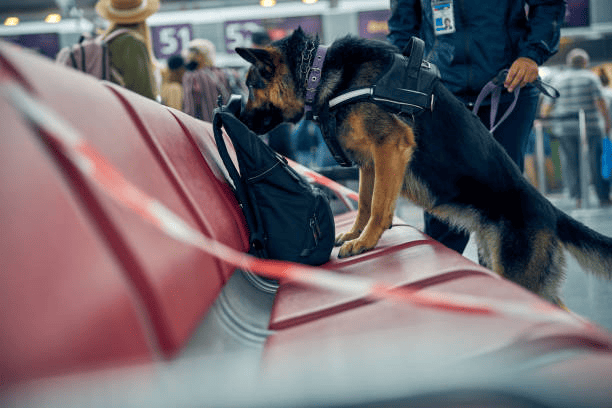Can sniffer dogs smell drugs inside you? The image of a sleek sniffer dog, nose twitching with precision, supposedly detecting illegal substances hidden within unsuspecting individuals, is a familiar trope in movies and media. Law enforcement agencies typically use police dogs and sniffer dogs to detect drugs.
But how much truth lies beneath this dramatic portrayal? Can these specially trained canines truly sniff out drugs concealed within our bodies? These intriguing questions spark heated debates, ignites anxieties, and warrant closer examination.
We’ll examine the arguments from both sides, weighing the potential benefits against the ethical concerns, and ultimately shed light on whether these canine companions can truly peer into the human body to uncover hidden substances. Read on to learn more about the topic “Can sniffer dogs smell drugs inside you?”
What Does the Law Say?
There are laws related to “can sniffer dogs smell drugs inside you” under Section 148 and 149 of the Law Enforcement (Powers and Responsibilities Act) 2002. Police officers can without a warrant utilise drug detection dogs for “general drug detection” on individuals in specific locations:
- Licensed liquor establishments: Excluding restaurant or dining areas.
- Public event venues: Hosting sporting events, concerts, festivals, etc.
- Public transport: Buses, trains, and designated stations along their routes.
- Tattoo parlours: Authorised by the Tattoo Industry Act 2012.
- Kings Cross precinct: A designated area within NSW as defined by the Liquor Act 2007 (NSW).
- Restricted premises: Defined under the Restricted Premises Act 1943.
However, police officers need a warrant to use sniffer dogs for “general drug detection” in public places if they lack reasonable suspicion of drug activity. Warrant applications are generally:
- Initiated by a police officer with reasonable belief that individuals in a public place might be engaging in drug offences.
- Granted by an authorised officer upon being satisfied of the reasonable grounds presented.
Warrant details authorises any police officer to use a sniffer dog for “general drug detection” within the specified public place and timeframe. Applications must disclose whether drug detection dog operations will be covert.
Training for Drug Sniffer Dogs
In this article about “Can sniffer dogs smell drugs inside you?”, we should discuss how dogs are trained to detect drugs. Becoming a drug sniffer dog and handler is a demanding yet rewarding pursuit. Each team undergoes a comprehensive 7-month training programme before graduating.
These police drug dogs hone their skills to detect illicit drugs, firearms, explosives, currency, and tobacco. They learn to navigate diverse environments within the Australian Border Force (ABF) and effectively locate prohibited and regulated items.
Detector Dog Handlers are specialised Border Force officers who embark on a unique career path. Candidates are typically selected from General Duties officers and must apply to join the programme. Their training journey unfolds in three stages:
Stage 1: Foundation Building (11 weeks)
This initial stage takes place at the Melbourne facility, where handlers receive intensive training in dog handling, obedience, and detection techniques.
Stage 2: On-the-Job Experience (3 months)
Handlers return to their home region and apply their learned skills in practical settings, working alongside their canine partners.
Stage 3: Final Assessment and Refinement (3 weeks)
The concluding stage involves intensive evaluations at the training facility, ensuring both handler and dog meet the rigorous performance standards for graduation.

Maintaining Peak Performance
Detector Dog Handlers are responsible for the continuous well-being, health, and skill development of their canine partners. A formal assessment process ensures both dog and handler maintain the highest performance standards. Regular feedback reports (every 4 months) identify areas of strength and weakness, allowing for targeted improvement and ongoing success.
So can sniffer dogs smell drugs inside you? Yes. However, this will depend on their accuracy and will depend on their training, experience, and the situation. While generally reliable, they can still make mistakes. Hence, this may lead to false positives (alerting to nonexistent drugs) or false negatives (missing actual drugs).
Read: Your Rights During a Strip Search | JB Solicitors
Types of Searches
According to the Customs Act 1901 customs or police personnel may do one of two types of personal searches on individuals who are suspected of bringing illegal narcotics (border restricted drugs) into Australia.
- Frisk Search: This is a quick external pat-down of the person’s belongings, including anything they choose to take off.
- External Search: This includes a more extensive examination of the body’s exterior (avoid bodily cavities) and every article of clothes worn.
The officer may ask a magistrate or a specially authorised customs officer to issue an order for an exterior search if the subject refuses to submit to a frisk or an external search.
Can Sniffer Dogs Smell Drugs Inside You: Legal and Illegal Drugs
Let’s discuss legal and illegal drugs in Australia in this article about “can sniffer dogs smell drugs inside you”. Illegal drugs, like amphetamines, cannabis, ecstasy, and heroin, pose serious threats to your health, safety, and well-being. On the other hand, alcohol, caffeine, nicotine and over the counter and prescribed drugs are legal and more regulated in Australia.
Here’s a deeper dive into why they’re banned, and the risks associated with them:
Unpredictable Composition and Strength:
- Unlike regulated medications, illegal drugs lack quality control. They can be laced with harmful additives, unknown substances, or even contaminants, making their effects unpredictable and potentially life-threatening.
- The strength of illegal drugs can vary significantly from batch to batch, increasing the risk of overdose, even for experienced users.
Physical and Mental Health Risks:
- Addiction: Illegal drugs are highly addictive, leading to compulsive use despite negative consequences. This can disrupt your personal and professional life, strain relationships, and cause financial problems.
- Physical Damage: Each drug has specific risks. Amphetamines can increase heart rate and blood pressure, potentially leading to stroke or heart attack. Cannabis can impair memory and cognitive function, while heroin damages the lungs and immune system. Ecstasy can cause overheating, hyperthermia, and even death.
- Mental Health Issues: Illegal drugs can exacerbate existing mental health conditions like anxiety and depression, and even trigger new ones like psychosis.

How Can Criminal Lawyers Help?
In conclusion, there are a number of intricate legal issues surrounding the employment of sniffer dogs in narcotics detection in Australia. While most sniffer dogs use by police is permitted in certain areas and under certain circumstances, situations outside of these bounds may necessitate a warrant and present legal issues.
Keep in mind that handling these legal nuances is essential. In the event that sniffer dog searches come up in New South Wales, you should definitely get professional legal assistance from JB Solicitors. Our criminal lawyers can help our clients with:
- Knowing their legal rights and options during drug searches
- Legal representation if the NSW police force or police officers proceeded with a strip search without a warrant.
- Getting a lower penalty if you were found guilty of drug possession.
- Answer other drug related questions aside from “can sniffer dogs smell drugs inside you?”
Contact us today if you need help with drug related matters or other criminal law matters.
